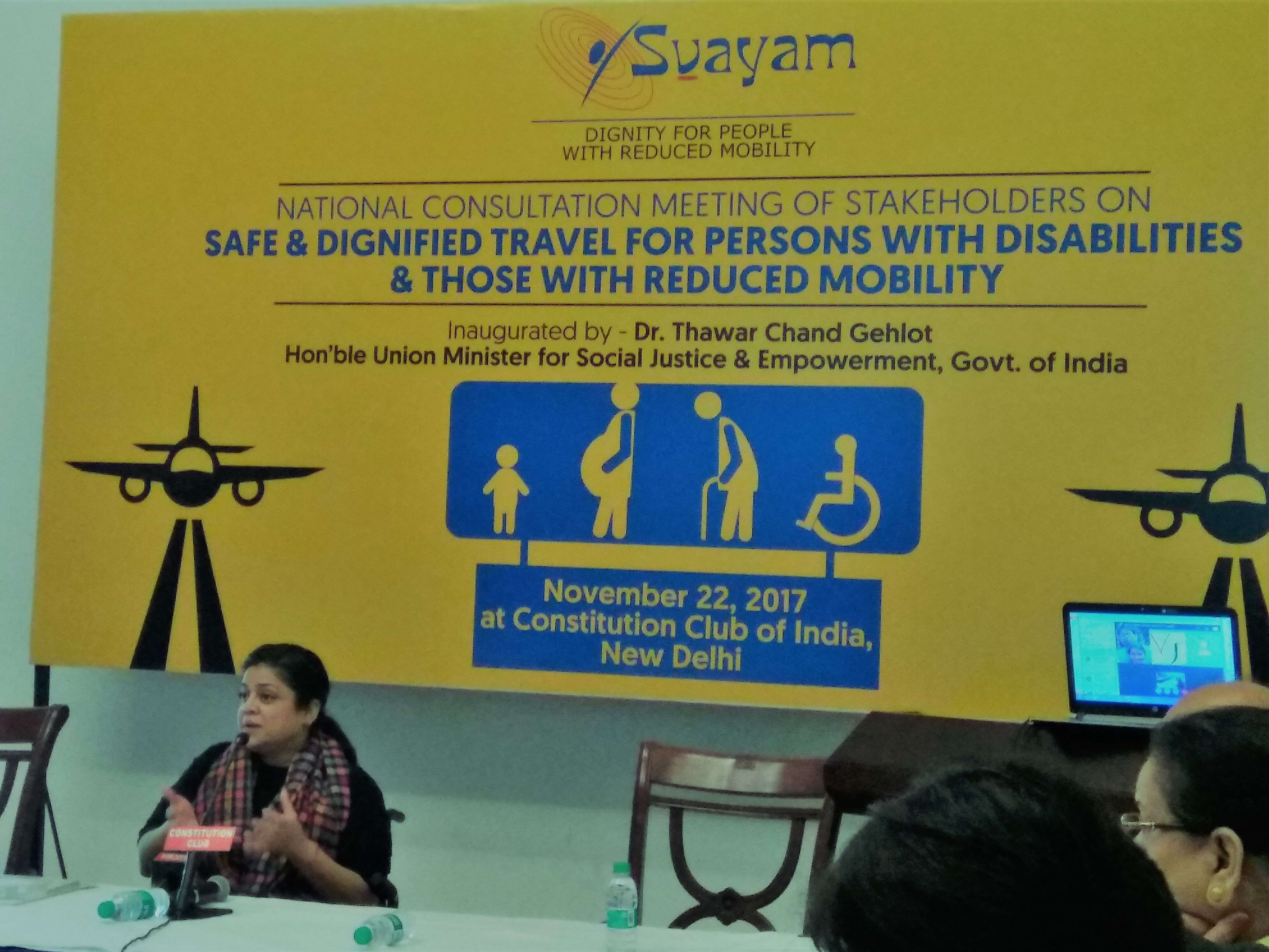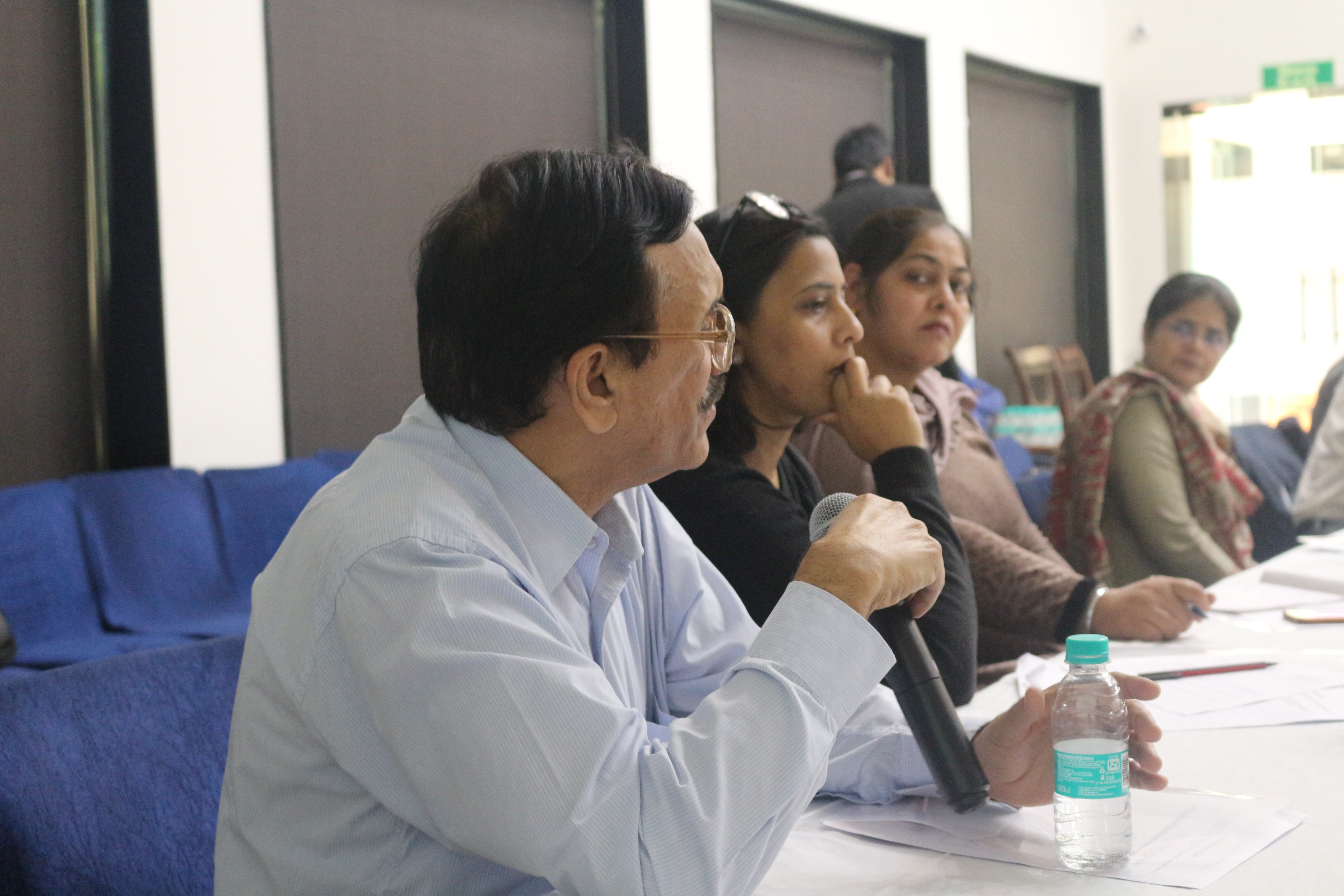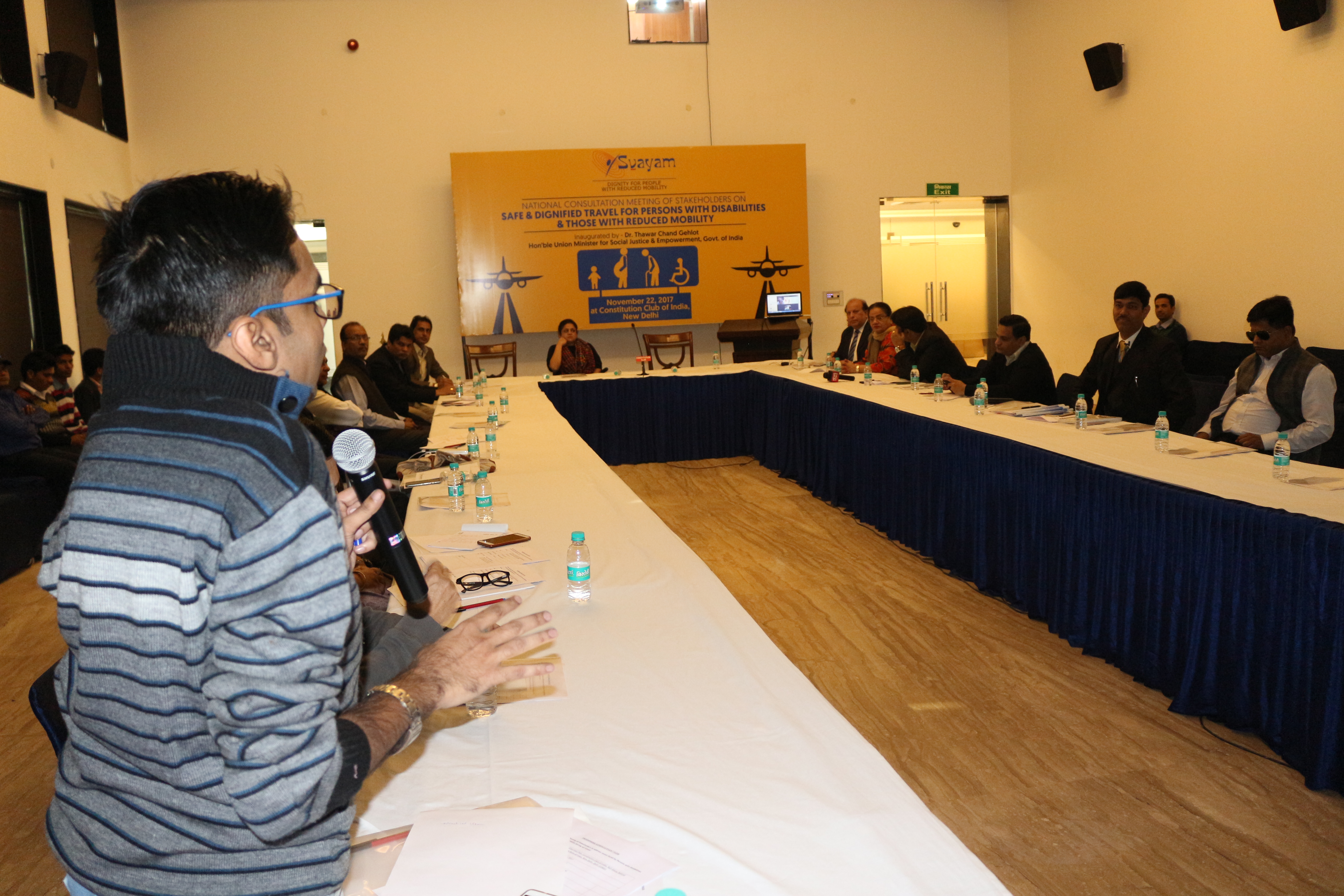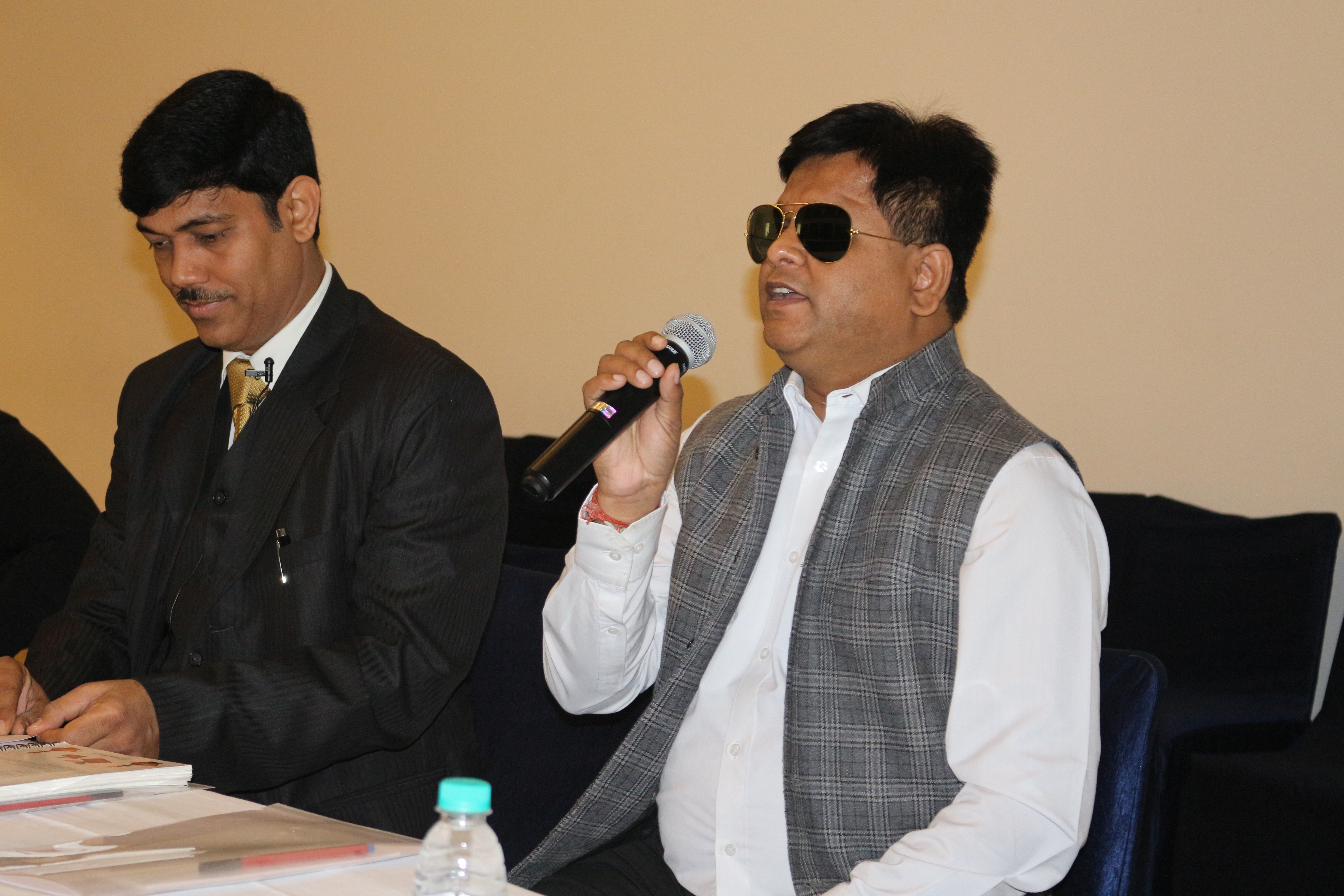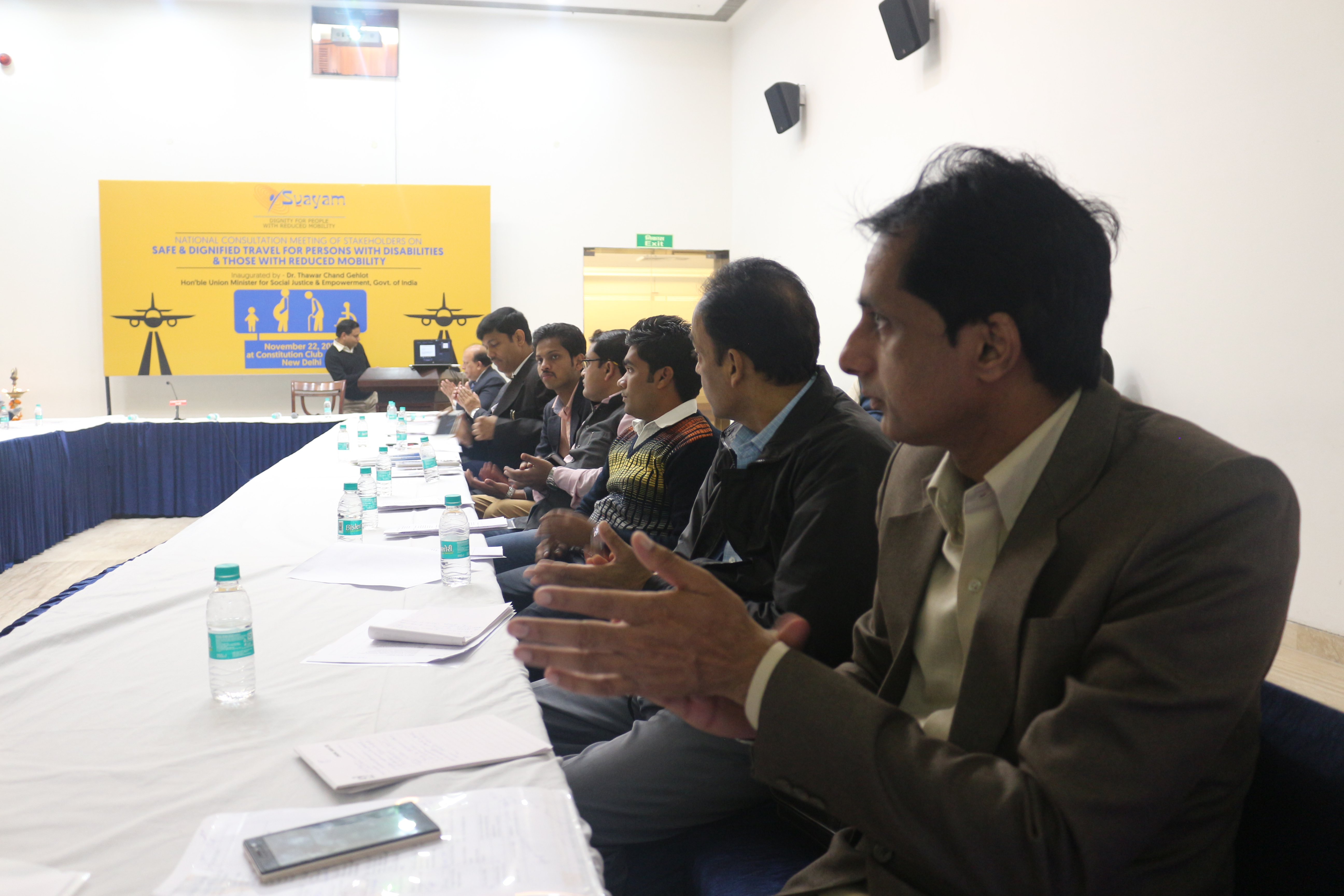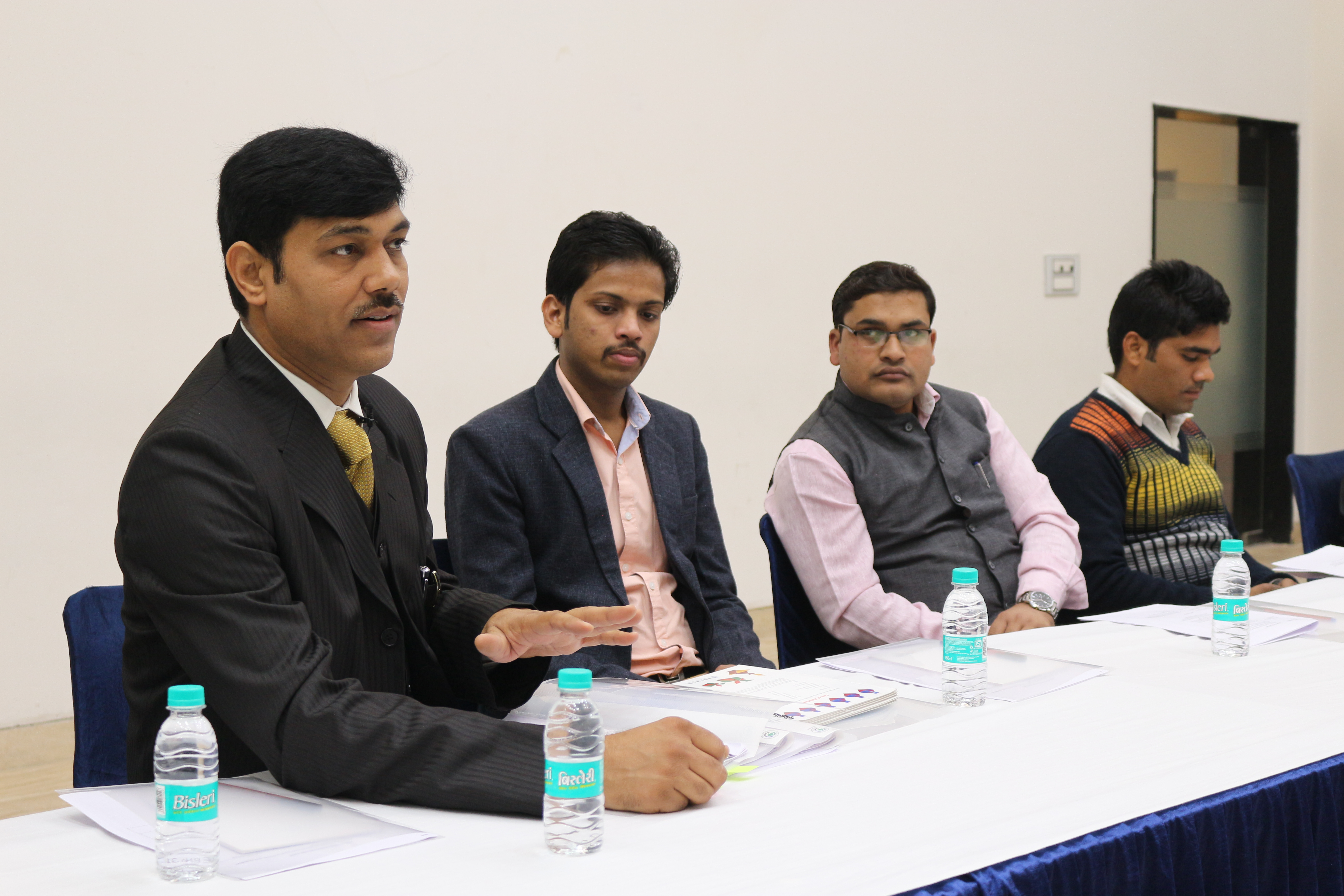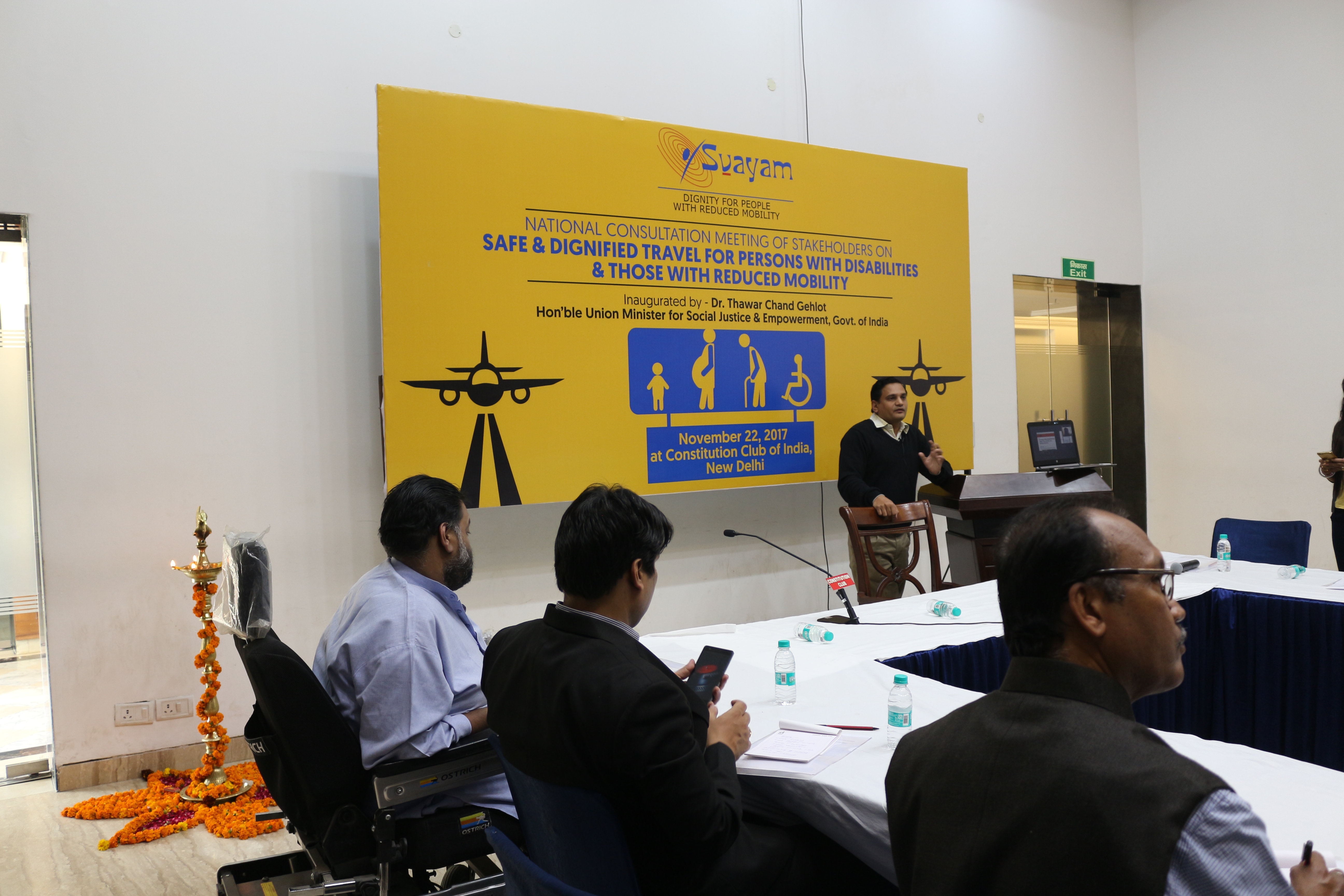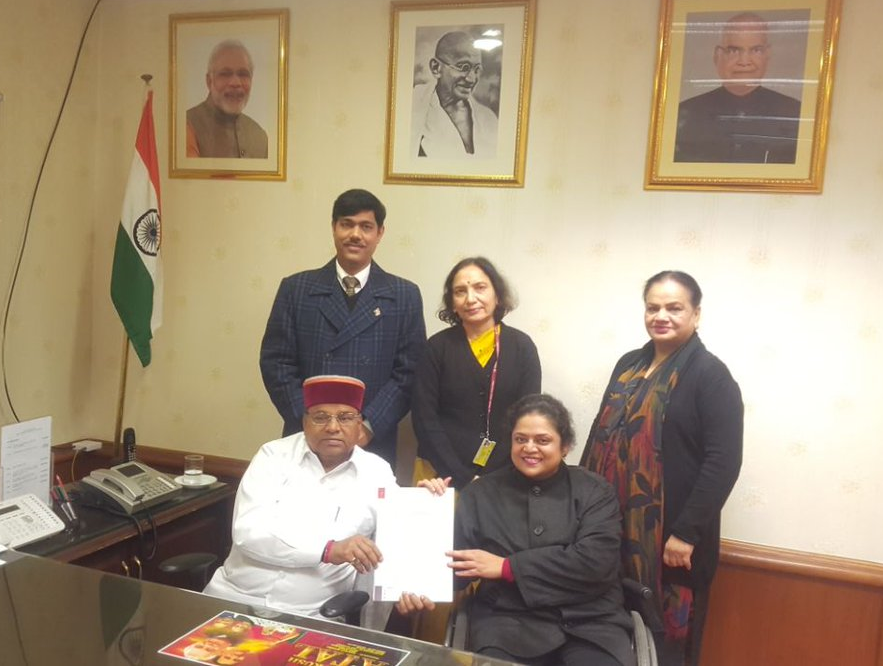Founder of a pioneering dream – “To Rethink, Redesign, Rebuild a newer world to empower every soul”, an accessibility crusader, India’s first women leader to have broken the glass ceiling in the Steel, Oil and Energy sector, young and dynamic Managing Director of Jindal SAW Ltd. Ms. Sminu Jindal gave away the ‘Svayam Accessibility Awards 2018 (Taiwan Edition)’ at Taipei on the sidelines of 15th International Conference on Mobility and Transportation for the Elderly and Disabled People (TRANSED2018), on 14th November 2018 to leading government and non-government agencies of Taiwan for their wonderful initiatives to promote #Accessibility4All and inclusion.
The Call for Nomination received an overwhelming response from across Taiwan – both from government organisations as well as businesses and social enterprises.
Board of Jury
The Board of Jury for Svayam Accessibility Awards, comprised of International experts and practitioners and included Ms. Ann Frye, Director, Ann Frye Ltd., U.K. and Member, International Activities Sub Committee of TRB ABE 60, Prof. (Ms.) Anabela Simões, Ergonomics Department, Technical University of Lisbon, Portugal and Member, Research Sub Committee of ABE(60) TRB, Mr. Rex CK Luk, Hong Kong Welfare Society, Member, TRB ABE 60 Committee, Mr. Joey Goldman, Independent Consultant/Co-Chair TRB ABE 60, Dr. Geetam Tiwari, Transport Research & Injury Prevention Program (TRIPP), Indian Institute of Technology (IIT) New Delhi, Mr. Mohammed Yousuf, US Department of Transport and Member ABE 60, Mr. Anuj Malhotra, Centre for Green Mobility, India, Mr. Amit Bhatt, Director – Integrated Transport, Sustainable Cities, World Resources Institute, India, Prof. M. Balakrishnan, Computer Science Engineering Department, IIT Delhi, and Prof. Sheila Mitra –Sarkar, Founder, Future Trans Consulting and Member, ABE 70 – Women’s Issues in Transportation.
Introductory Film to Svayam Accessibility Awards, its legacy and nominees of 2018 edition.
RECIPIENTS OF SVAYAM ACCESSIBILITY AWARDS 2018 (TAIWAN EDITION):
Category: MOST ACCESSIBLE PUBLIC TRANSPORT (POLICY)
Institute of Transportation (IOT), Ministry of Transportation and Communications (MOTC), Taiwan
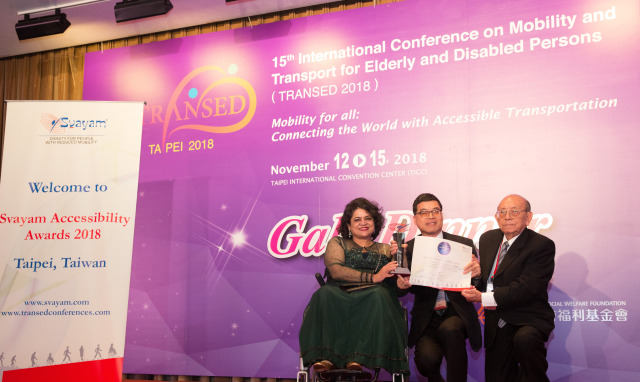
Dr. Chi-Kuo Lin (centre), Director General, Institute of Transportation, MOTC, Taiwan, receiving Svayam Accessibility Award 2018 from Svayam Founder Ms. Sminu Jindal & Mr. Patrick Yey, Hony. Chairman, TRANSED2018, at Taipei on 14 Nov 2018 on the sidelines of 15th International Conference on Mobility and Transport for Elderly and Disabled Persons (TRANSED2018)
Citation: The Institute of Transportation (IOT) helps the MOTC in accessible public transportation using a promotion cycle with concepts introduction, planning and design demonstration, operation demonstration, and regulation and policy development. IOT has been successfully assisting MOTC to establish a public transportation that is more in line with the needs of diverse groups, from barrier-free to universal design.
Institute of Transportation, Ministry of Transportation and Communications (IOT-MOTC) introduced the concepts of barrier-free environment through a series of researches since 1990. In 1995, IOT performed a series of studies that demonstrated how to plan, design, and operate the barrier-free vehicles and services.
With the help of a series of researches, IOT successfully demonstrated the planning, design, and operation of barrier-free vehicles and services. IOT also drafted the Regulation based on the gradually implemented accessible public transportation. The Regulation draft accomplished the legalization of accessible public transportation in land (road and railway), sea, and air transportation.
IOT helped towards facilitating the “sustainable development of policies for accessible public transportation to establish an inclusive environment.”
Congratulations Institute of Transportation, MOTC!
Category: MOST ACCESSIBLE PUBLIC TRANSPORT (PRACTICE)
The Bureau of Transportation, Taichung City Government, Taiwan
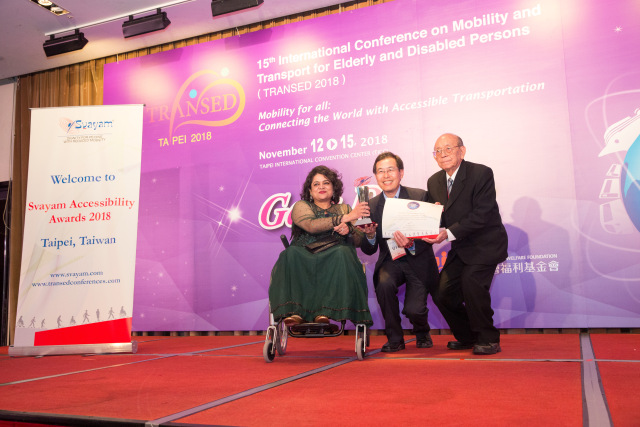
Mr. Hui-Sheng, Feng, (Centre) Deputy Director, Transportation Bureau, Taichung City Government, Taiwan, receiving Svayam Accessibility Award 2018 from Svayam Founder Ms. Sminu Jindal & Mr. Patrick Yey, Hony. Chairman, TRANSED2018, at Taipei on 14 Nov 2018 on the sidelines of 15th International Conference on Mobility and Transport for Elderly and Disabled Persons (TRANSED2018)
Citation: The Bureau of Transportation, Taichung City Government has undertaken inclusion- friendly accessible transport initiatives such as “Adopting Connected Vehicle Technology to Improve Bus Service” and “Accessibility for Blind and Visually Impaired Passengers”. The Bureau’s ‘City All-in-One Service’ is a ‘visually impaired navigation technology’ combined with public transport applications’ services, which is truly a great enabler. The system also works for inclusion as general population and visually impaired passengers can use the bus service together without any barrier.
In the last two years, the Bureau had started to develop Smart Transportation IOV Service, which includes Continuous promotion of Accessibility for Blind and Visually Impaired Passengers services, Bus shelter flow, and traffic detection. The buses are equipped with Advanced Driver Assistance Systems (ADAS) & driving recorders (MDVR).
Congratulations Bureau of Transportation, Taichung City Government!
Category: MOST ACCESSIBLE TOURIST ATTRACTION
North Coast & Guanyinshan National Scenic Area Administration, Tourism Bureau, MOTC, Taiwan
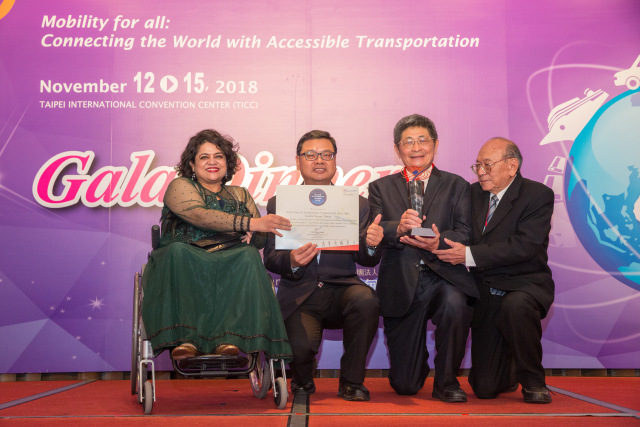
Mr. Shi-Ching, Chang (Second from Left), Dy Director General, Tourism Bureau MOTC Taiwan and Mr. Jenn-Chyan Chang (second from right), Director of North Coast & Guanyinshan National Scenic Area Administration, Tourism Bureau, MOTC, Taiwan, receiving Svayam Accessibility Award 2018 from Svayam Founder Ms. Sminu Jindal & Mr. Patrick Yey, Hony. Chairman, TRANSED2018, at Taipei on 14 Nov 2018 on the sidelines of 15th International Conference on Mobility and Transport for Elderly and Disabled Persons (TRANSED2018)
Citation: In order to a create disabled- friendly environment, the North Coast & Guanyinshan National Scenic Area Administration, Tourism Bureau, MOTC, Taiwan, has included accessibility as one of its main focus areas toward “Building a Barrier-Free and Accessible Environment at the Keelung Heping Island Park” and North Cost Accessibility Route”, and allocated a dedicated budget to develop accessible facilities.
North Coast offers nursery room, accessible toilet and accessible parking lot, accessible route, while also offering wheelchairs and baby stroller on rent. As North Coast owns one of the most unique geomorphic and incredible beaches in the world, it made the entire facilities accessible so that tourists with disabilities can also enjoy cruise tourism.
Congratulations North Coast & Guanyinshan National Scenic Area Administration, Tourism Bureau, MOTC, Taiwan!
Category: BEST PRACTICE AWARDS
1. Best Practice (Accessible Transport) : Bureau of Transportation, Tainan City Government, Taiwan
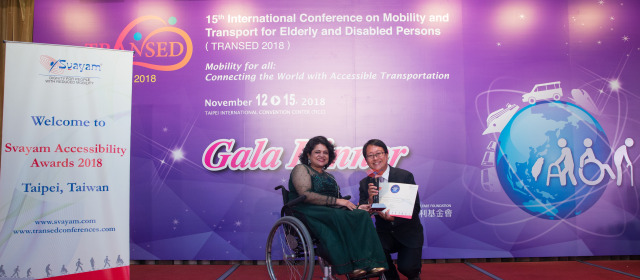
Mr. Wu Yu-Chiu, Section Chief of Transportation Management Section, Tainan City Government, Taiwan, receiving Svayam Accessibility Award 2018 from Svayam Founder Ms. Sminu Jindal at Taipei on 14 Nov. 2018 on the sidelines of 15th International Conference on Mobility and Transport for Elderly and Disabled Persons (TRANSED2018)
Citation: The Bureau of Transportation, Tainan City Government’s “Bus Rapid Transit” system helps in creating a barrier-free environment of bus service. There are 149 low-floor buses now in Tainan with wheelchair zones, specific seats for guide dogs, and companion seats. In addition to 40% low-floor buses ratio, there are 607 new type bus shelters which have been built with LED dynamic information display systems, and 62 of them were selected to be equipped with “blind information dots” and “bus to the station voice broadcast” equipment.
“Rapid Public Transportation System” by the Bureau includes Bus Rapid Transit, Railway Rapid Transit, Inter-modal Stations Development, Demand Responsive Transportation Service (DRTS), Integration of Electronic Tickets and Information, and Advanced Public Transportation System.
Congratulations Bureau of Transportation, Tainan City Government!
2. Best Practice (Accessible Hospitality) : – OurCityLove Social Enterprise Co., Ltd., Taiwan
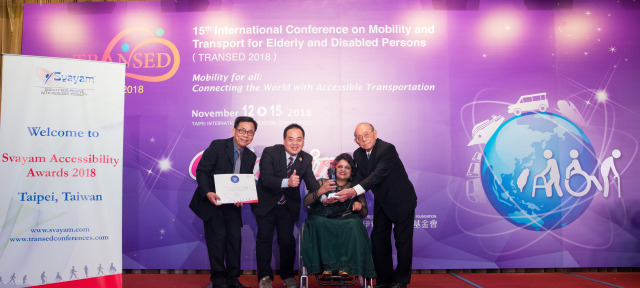
Prof. Dr. Chong Wey Lin (second from left), Founder and CEO, along with Mr. Jack Chen, Vice CEO, OurCityLove Social Enterprise Co. Ltd., Taiwan, receiving Svayam Accessibility Award 2018 from Svayam Founder Ms. Sminu Jindal & Mr. Patrick Yey (extreme right), Hony. Chairman, TRANSED2018, at Taipei on 14 Nov 2018 on the sidelines of 15th International Conference on Mobility and Transport for Elderly and Disabled Persons (TRANSED2018)
Citation: OurCityLove Social Enterprise Taiwan combines innovative technology and passionate social entrepreneurs to raise awareness, increase inclusivity and improve accessibility for the elderly, mobility impaired, and people with disabilities.
It is now the leading smart city accessibility information service partner for 15 city governments, 3000+ companies in public service category and 77 NGOs in Taiwan, Hong Kong, Singapore, and Malaysia. Many famous museums, shopping malls, hospitals, schools, transportation stations and government agencies have adopted OurCityLove’s advanced ICT solution to offer inclusive services to all.
Congratulations OurCityLove Social Enterprise!
3. Best Practice (Comprehensive rehabilitation & accessibility services for Persons with Disabilities)- Eden Social Welfare Foundation, Taiwan
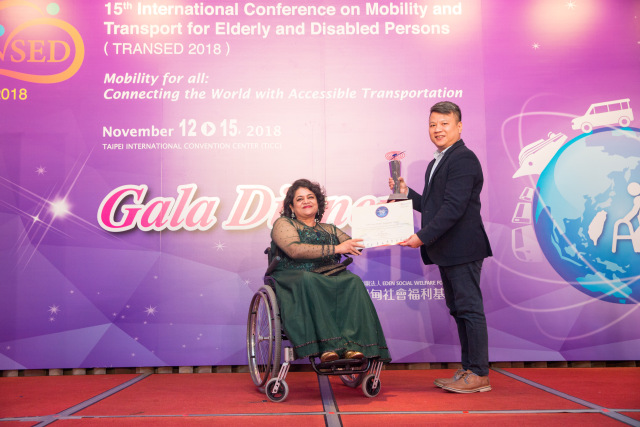
Mr. Juo-Sung HUANG, CEO, Eden Social Welfare Foundation, Taiwan, receiving Svayam Accessibility Award 2018 from Svayam Founder Ms. Sminu Jindal at Taipei on 14 Nov 2018 on the sidelines of 15thInternational Conference on Mobility and Transport for Elderly and Disabled Persons (TRANSED2018)
Citation: Eden Social Welfare Foundation has undertaken brilliant steps towards accessible para-transit systems, rehab bus transportation provisions, vocational training for persons with disabilities, job counselling, emotional therapy, as well as early intervention services for children with delayed development and residential care for seniors.
Eden has more than 100 service centres in Taiwan and overseas and serves nearly 200,000 people every year. Through a series of activities, such as “Love without Borders – Assistive Devices Donation Project”, Eden has successfully been promoting the cause of disabilities and accessibility in Taiwan and beyond.
Congratulations Eden Social Welfare Foundation!
4. Best Practice [Accessible Transport (Taxi service)] – Joint Award to The Yulon Group, Taiwan and the OurCityLove Social Enterprise, Taiwan
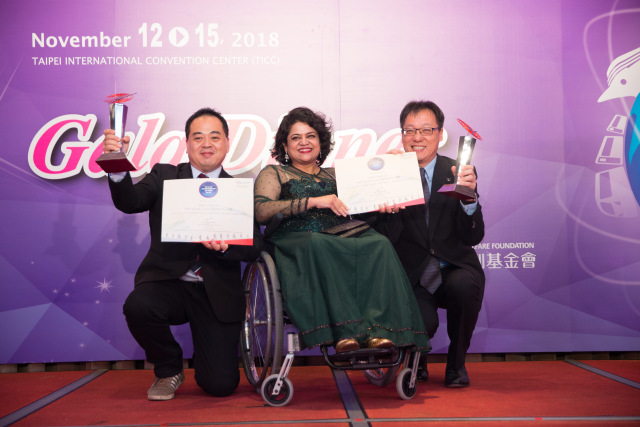
Mr. Vincent Tsao (extreme right) Vice President Luxgen Motor Co. Ltd, Yulon Group & Prof. Dr. Chong Wey Lin (extreme left), Founder and CEO, OurCityLove Social Enterprise Co. Ltd., Taiwan jointly receiving Svayam Accessibility Award 2018 from Svayam Founder Ms. Sminu Jindal at Taipei on 14 Nov 2018 on the sidelines of 15th International Conference on Mobility and Transport for Elderly and Disabled Persons (TRANSED2018)
Citation: The Yulon Group and the OurCityLove Social Enterprise have together redefined access to hotels with its inspiring accessible transport (Taxi service).
Their cooperation inspires social innovation and boosts accessible tourism services in Taiwan. “Luxgen V7 Eco‐Hyper” is the result of their joint design with the inputs from the people with disabilities, and is Taiwan’s first accessible vehicle.
With these breakthrough models, they have successfully tried to address a common frustration among the elderly and people with disabilities and their families — travelling far tourism.
Congratulations Yulon Group and the OurCityLove Social Enterprise!
5. Best Practice (Rehabilitation of People with Intellectual Disabilities) – Children Are Us Social Welfare Foundation, Taiwan
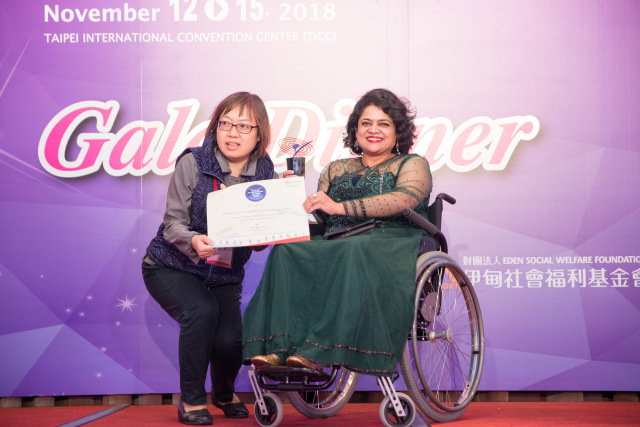
Ms. Sunny Hu, Director, Public Affairs, Children Are Us Social Welfare Foundation, Taiwan, receiving Svayam Accessibility Award 2018 from Svayam Founder Ms. Sminu Jindal at Taipei on 14 Nov 2018 on the sidelines of 15th International Conference on Mobility and Transport for Elderly and Disabled Persons (TRANSED2018)
Citation: Children Are Us Social Welfare Foundation (CAREUS) has constructed a safe working environment for children with intellectual disabilities and has demonstrated the Best Practice in their Rehabilitation. With assistance of social workers and industrial mentors, they teach children with ID professional skills, and have simplified the operational procedures through individualized and differentiated practical training and the design of assistive devices.
Children with ID are engaged in job matching and license acquisition to transform them from “service receivers” into “service providers.” Also, positive values are also being instilled into them for equal participation in the society.
Congratulations Children Are Us Social Welfare Foundation!
Media Coverage
Coverage of Svayam Accessibility Awards 2018, Taiwan Edition held on 14 Nov 2018 at Taipei.
- China Times, 15 Nov 2018
- Yam News, 15 Nov 2018
- Taiwan.net.tw 15 Nov 2018
- Epoch Times.com, 15 Nov 2018
- News E2.com, 15 Nov 2018
- CarNews.com, 15 Nov 2018
- tw.lifestyle, 15 Nov 2018
- 101 News Media, 15 Nov 2018
- TRANSED Conferences.com, 15 Nov 2018
See you in the next edition of Svayam Accessibility Awards 2021!

